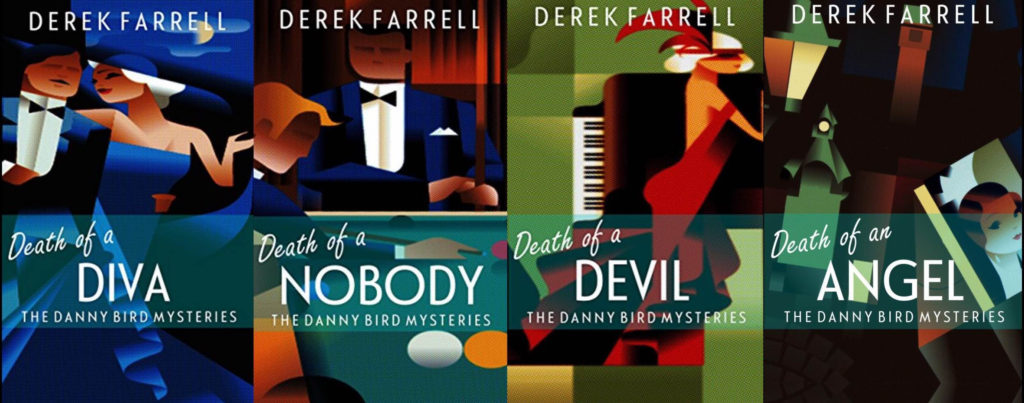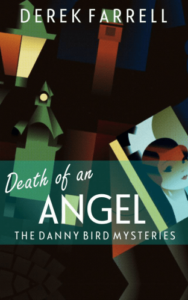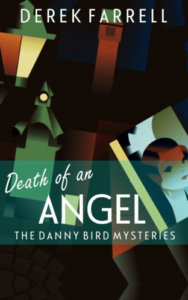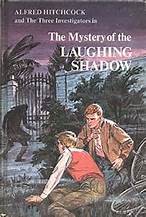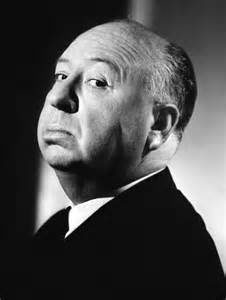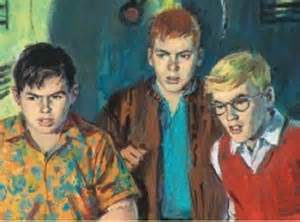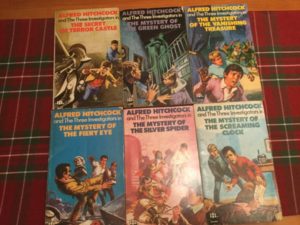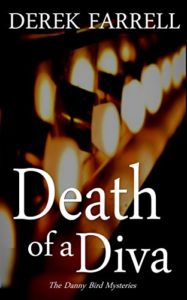Decades: Compiling the Ultimate Library with Derek Farrell
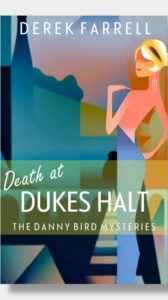 It is a thrill to welcome Derek Farrell back to Grab This Book, particularly as I can welcome Derek in his latest publication week. The new Danny Bird novel, Death at Dukes Halt, released yesterday and the book with accompanying (very cool) merch is available from the Fahrenheit Press website.
It is a thrill to welcome Derek Farrell back to Grab This Book, particularly as I can welcome Derek in his latest publication week. The new Danny Bird novel, Death at Dukes Halt, released yesterday and the book with accompanying (very cool) merch is available from the Fahrenheit Press website.
Full introduction and purchase links in a second, first a quick introduction to the challenge I set Mr Farrell.
This is Decades. I am inviting book lovers to join me and asking them to help me assemble the best library of books. I began this quest back in January and I had no books on my library shelves. Each week I invite a guest to join me and they are asked to select five of their favourite books to be added to my Ulitmate Library.
Now picking five books is a little too easy so I add a second rule which governs the choices each guest makes. They can only select one book per decade over five consecutive decades. I am told this leads to some angst.
So it is time to hand you over to Derek to introduce his selections. One of my all-time favourite reads is in the mix today, can you guess which?
 Derek Farrell is the author of the Danny Bird mysteries ‘Death of a Diva’ ‘Death of a Nobody,’ ‘Death of a Devil,’ ‘Death of an Angel,’ and ‘Death at Dukes Halt,’ as well as the novellas ‘Death of a Sinner,’ and ‘What goes around.’
Derek Farrell is the author of the Danny Bird mysteries ‘Death of a Diva’ ‘Death of a Nobody,’ ‘Death of a Devil,’ ‘Death of an Angel,’ and ‘Death at Dukes Halt,’ as well as the novellas ‘Death of a Sinner,’ and ‘What goes around.’
Derek is married and lives with his husband in West Sussex. They have no cats dogs goats or children, though they do have every Kylie Minogue record ever recorded. Twice.
He can be reached on twitter @derekifarrell or via his website www.derekfarrell.co.uk
His books can be purchased directly from the publisher here https://fahrenheit-press.myshopify.com/search?type=product&q=derek+farrell
Or from Amazon here https://www.amazon.co.uk/Derek-Farrell/e/B06XJ9C6XB?ref=sr_ntt_srch_lnk_1&qid=1603393406&sr=8-1
DECADES
Thanks so much for having me on this feature. I’m honoured to have my submissions joining those of so many amazing contributors before me.
I have always loved libraries and in fact my first book ‘Death of a Diva’ was dedicated to my dad, who took me to the library and gave me a universe to play in. Public Libraries are what made it possible for a kid like me to read any- and everything I wanted, to find the stuff I loved, and to dream of being a writer.
But it was my dad who showed me that reading is a joyful activity, and should always be joyful. “Read the classics, if you want to,” he told me once. “Or don’t, if you don’t want to. The key thing is to love what you read.”
My choices are below, and I hope they inspire some of your readers to find some new loves.
60s – The Jewel in the Skull by Michael Moorcock (1967)
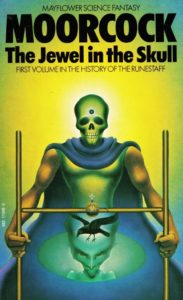 What’s it about: In a post-nuclear holocaust future, where science and sorcery co-exist. the Dark Empire of Granbretan is expanding across Europe. Baron Meliadus, an emissary of the empire, is sent to the castle of Count Brass to try to persuade him to side with the empire against the other European courts. While in the castle, he begins to court the Count’s daughter, Yisselda, but she refuses to elope with him. Meliadus attempts to kidnap her, but is defeated by Count Brass and swears an oath on the legendary Runestaff to gain power over Count Brass, gain Yisselda and destroy their lands.
What’s it about: In a post-nuclear holocaust future, where science and sorcery co-exist. the Dark Empire of Granbretan is expanding across Europe. Baron Meliadus, an emissary of the empire, is sent to the castle of Count Brass to try to persuade him to side with the empire against the other European courts. While in the castle, he begins to court the Count’s daughter, Yisselda, but she refuses to elope with him. Meliadus attempts to kidnap her, but is defeated by Count Brass and swears an oath on the legendary Runestaff to gain power over Count Brass, gain Yisselda and destroy their lands.
In order to achieve these ends, he sends a newly-captured Rebel – Duke Dorian Hawkmoon Von Koln – to the castle, and to ensure Hawkmoon does not betray him, he uses dark sorcery to embed a black jewel in the middle of Hawkmoon’s skull, the jewel acting as a camera that will transmit everything Hawkmoon sees and hears back to Meliadus…
Why it should be in the Library: I discovered these books in the early 80s, having never been much of a sci-fi or fantasy fan. I’m still not a huge reader of those genres, but I spent a summer reading this seies (“The High History of the Runestaff”). The stories, the characters and the feeling of just HAVING to know what happens next, has never left me. This book taught me that regardless of genre, a great story is a great story, and these are great great stories.
70s – Curtain by Agatha Christie (1975 – or was it?)
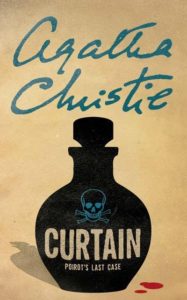 What’s it about? The novel features Hercule Poirot and Arthur Hastings in their final appearances in Christie’s works. It is a country house novel, with all the characters and the murder set in one house. Not only does the novel return the characters to the setting of her first, The Mysterious Affair at Styles, but it reunites Poirot and Hastings, who last appeared together in Dumb Witness in 1937 as they hunt for a serial killer who has already gotten away with murder five times. But this time, Porot is determined that justice will be served.
What’s it about? The novel features Hercule Poirot and Arthur Hastings in their final appearances in Christie’s works. It is a country house novel, with all the characters and the murder set in one house. Not only does the novel return the characters to the setting of her first, The Mysterious Affair at Styles, but it reunites Poirot and Hastings, who last appeared together in Dumb Witness in 1937 as they hunt for a serial killer who has already gotten away with murder five times. But this time, Porot is determined that justice will be served.
Christie actually wrote this book in the middle of the Blitz as bombs rained down around her. A sign of how deeply a writer can become enmeshed with their characters is that instead of worrying about her own safety, she began to worry about what would happen to Poirot if she were to be killed in a bombing.
So she wrote the final Poirot novel, which was delivered with instructions that it was to be published only after she had died. The manuscript was then then kept in a safe (with a copy in a similar safe at her New York publishers) for over thirty years.
Why Should it be in the Library? Because whatever your feelings about Christie’s work, her impact on the crime genre is unarguable, and Curtain is a wonderful mystery novel, the clues woven seamlessly through an admittedly somewhat contrived scenario. Poirot has always been an old man, but here he’s close to decrepit, wheelchair-bound at times, and raging at the cruelty of time that can decay a body but leave his little grey cells as vital as they ever were. Plus, the ending <no spoilers> is a genuine GASP moment that stays with anyone who knows Poirot long after the book.
80s – Blue Heaven by Joe Keenan (1988)
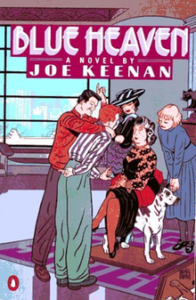 What’s it about? Philip Cavanaugh is surprised to hear that his best friend Gilbert is engaged to be married to Moira. There are two reasons for his surprise: Gilbert loathes Moira with every fibre of his being. But more importantly, Gilbert is flamingly gay.
What’s it about? Philip Cavanaugh is surprised to hear that his best friend Gilbert is engaged to be married to Moira. There are two reasons for his surprise: Gilbert loathes Moira with every fibre of his being. But more importantly, Gilbert is flamingly gay.
Gilbert finally confides in Phillip that the entire marriage is a sham designed to maximise the cash gifts from the family of his new Italian-American stepfather, and by the time the trio realise that said family are the Mafia, and that their little attempted fraud may well end up with the three of them wearing concrete overcoats and taking a dip in the East River, they are in too deep to walk away.
Joe Keenan wrote three novels featuring Gilbert and Phillip as well as a rather sweet Broadway musical before becoming a writer and Executive Producer for Fraser and working on Desperate Housewives and Glee.
Why Should it be in the Library? Because it’s quite simply one of the funniest and best plotted / paced / written books of all time. I read it they year it was first published and it has never been off my bookshelves since.
90s – The Burglar in the Library (1997)
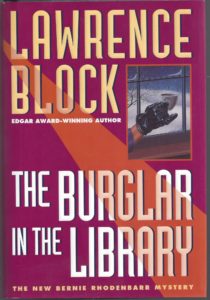 What’s it about? For Bernie Rhodenbarr, bookseller and compulsive burglar, a weekend at a country bed & breakfast inn takes an unexpected twist when a valuable book is stolen and dead body turns up in the library.
What’s it about? For Bernie Rhodenbarr, bookseller and compulsive burglar, a weekend at a country bed & breakfast inn takes an unexpected twist when a valuable book is stolen and dead body turns up in the library.
Why Should it be in the Library? In the early 2000s I attended a crime fiction course at City Lit in London. On the first night we each had to declare our favourite crime writer. I, of course, made my case for Agatha Christie. But a woman who would eventually become a dear friend and mentor to me talked about this guy called Lawrence Block – an American who had written dozens of books and won dozens of prizes. Block’s not James Joyce. His career was not built on groundbreaking origination, but on consistently and conscientiously producing excellent work within a genre he clearly loves. This has to necessitate, at times, playing with the tropes of that genre, and here we find Bernie in basically a Golden Age country house mystery. Every character is not only a suspect, but suspicious; everyone has both a motive and an alibi; and circumstances conspire to ensure that the murderer must be one of the people trapped in the inn.
Block is normally recognised for his darker Matt Scudder novels, but I think that the Bernie the Burglar books more openly reflect his sheer joy in the genre. This one’s playful but fiendishly well plotted, and I’m putting this one in to the library because it’s a book that has given me much joy by a writer whose work I admire greatly. And really, if you can’t love the books in your library, what’s the point in having a library?
00s – The Lost Army of Cambyses by Paul Sussman (2002)
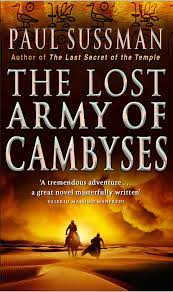 What’s it about? 523 BC: the Persian pharaoh Cambyses dispatches an army across Egypt’s western desert to destroy the oracle at Siwa. Legend has it that somewhere in the middle of the Great Dune Sea his army is overwhelmed by a sandstorm and lost forever.
What’s it about? 523 BC: the Persian pharaoh Cambyses dispatches an army across Egypt’s western desert to destroy the oracle at Siwa. Legend has it that somewhere in the middle of the Great Dune Sea his army is overwhelmed by a sandstorm and lost forever.
Two and a half millennia later, a mutilated corpse is washed up on the banks of the Nile at Luxor, an antiques dealer is savagely murdered in Cairo, and a British archaeologist is found dead at the ancient necropolis of Saqqara.
The incidents appear unconnected, but Inspector Yusuf Khalifa of the Luxor police is not so sure.
And so he begins an investigation that will lead him into the forbidding, barren heart of the western desert, and the answer to one of the greatest mysteries of the ancient world…
Why Should it be in the Library? Because it’s a brilliant thriller nobody’s ever heard of from a writer who was taken from us tragically early. Paul Sussman was an archaeologist, a journalist and an author whose Middle-Eastern set thrillers mixed high octane page turners with genuine humanity, and confronted the heart-breaking complexities of the region while never losing sight of their primary function: To keep you turning those pages.
He died of a ruptured aneyurism just weeks before his 46th birthday, and days before his final novel “The Labyrinth of Osiris” was published. That book, in particular, is one of the best and most heartbreaking thrillers I’ve ever read.
Sussman’s work is pacy, tight, thrilling, and human. It carries a vast amount of historical research so lightly that the reader doesn’t even know how much they’re learning as they read these hugely enjoyable books. And his tragically early death is a reminder to each and every one of us to strive every day to live the best life possible, and to write the best book we possibly can.
Huge thanks to Derek for adding a great mix of titles to my Library. I know each week someone’s TBR grows thanks to the recommendations of my guests – I hope that you will also add Death at Dukes Halt to your shopping this week.
DECADES WILL RETURN
